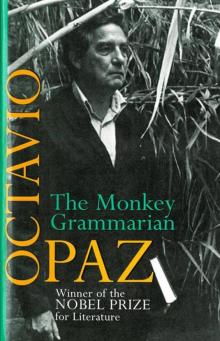The Monkey Grammarian


Author: Octavio Paz
Category: Other3
Published: 1990
Series:
View: 202
Read OnlineHanumān, the red-faced monkey chief and ninth grammarian of Hindu mythology, is the protagonist of this dazzling narrative--a mind-journey to the temple city of Galta in India and the occasion for Octavio Paz, the celebrated Mexican poet and essayist, to explore the origin of language, the nature of naming and knowing, time and reality, and fixity and decay. *Selected Review:The very concept of grammar - a system in which language can be fixed, structured and therefore transformed - is one of the great achievements of Indian culture. In the past 50 years philosophers and linguists have devoted enormous intellectual energies to the investigation of how the concept was developed among the thinkers of ancient India, for whom the idea became a central problem in their philosophical tradition. Was language, our faculty for naming objects, given by God or did man invent it, either on his own or with powers borrowed from the divine realm? Through a species of time-space journey akin to Hanuman's, Octavio Paz explores this dilemma: ''What is language made of,'' he asks, ''and most important of all, is it already made, or is it something that is perpetually in the making?'' (New York Times)*About the Author:Octavio Paz (1914-1998) was born in Mexico City. He wrote many volumes of poetry, as well as a prolific body of remarkable works of nonfiction on subjects as varied as poetics, literary and art criticism, politics, culture, and Mexican history. He was awarded the Jerusalem Prize in 1977, the Cervantes Prize in 1981, and the Neustadt Prize in 1982. He received the German Peace Prize for his political work, and finally, the Nobel Prize for Literature in 1990.About the Translator:Helen Lane was the preeminent translator of French, Spanish, Portuguese, and Italian fiction. Among the long list of authors she translated are Augusto Roa Bastos, Jorge Amado, Luisa Valenzuela, Mario Vargas Llosa, Marguerite Duras, Nélinda Piñon, and Curzio Malaparte.
 Lucas (Texas Boudreau Brotherhood Book 5)
Lucas (Texas Boudreau Brotherhood Book 5) Again for the First Time
Again for the First Time The Virgin's Revenge: Rancho del Cielo, Book 4
The Virgin's Revenge: Rancho del Cielo, Book 4 Chasing the Boogeyman
Chasing the Boogeyman The Forgotten Daughter
The Forgotten Daughter Town In a Blueberrry Jam
Town In a Blueberrry Jam Husband for a Weekend
Husband for a Weekend Christmas Promises at the Little Wedding Shop
Christmas Promises at the Little Wedding Shop